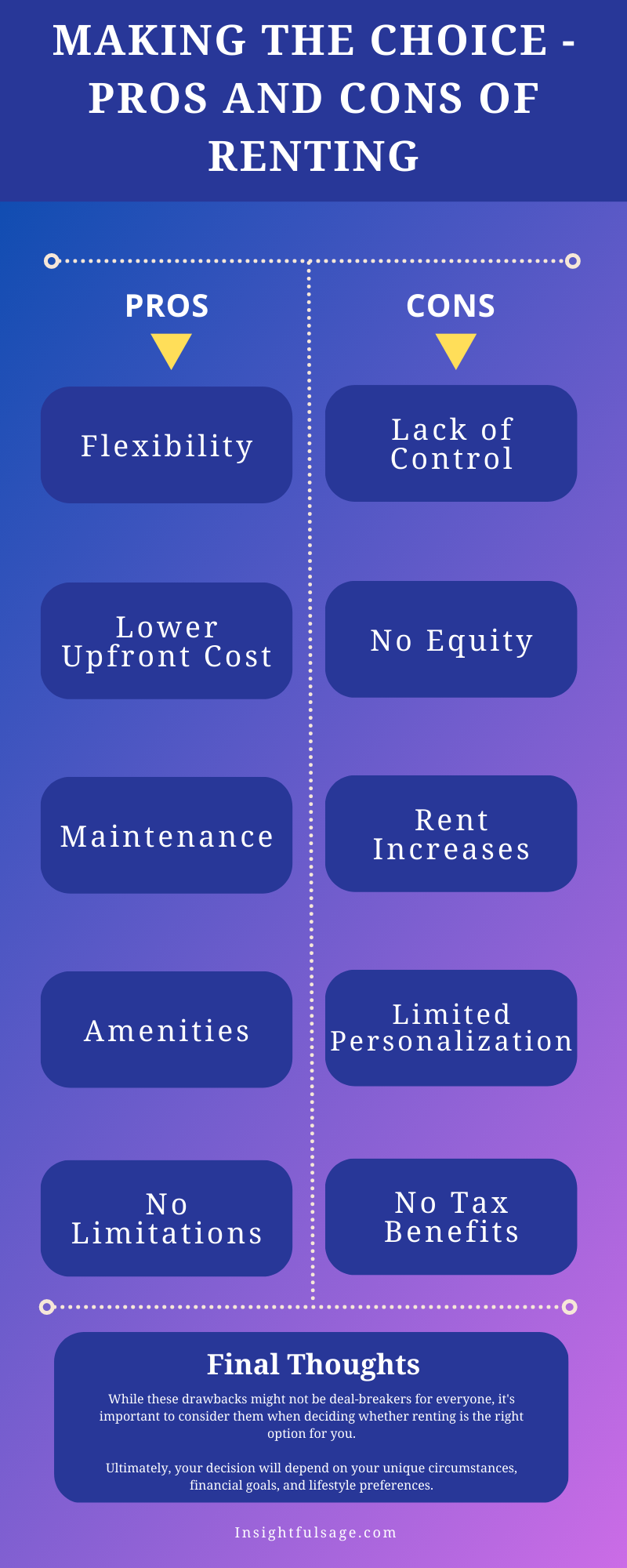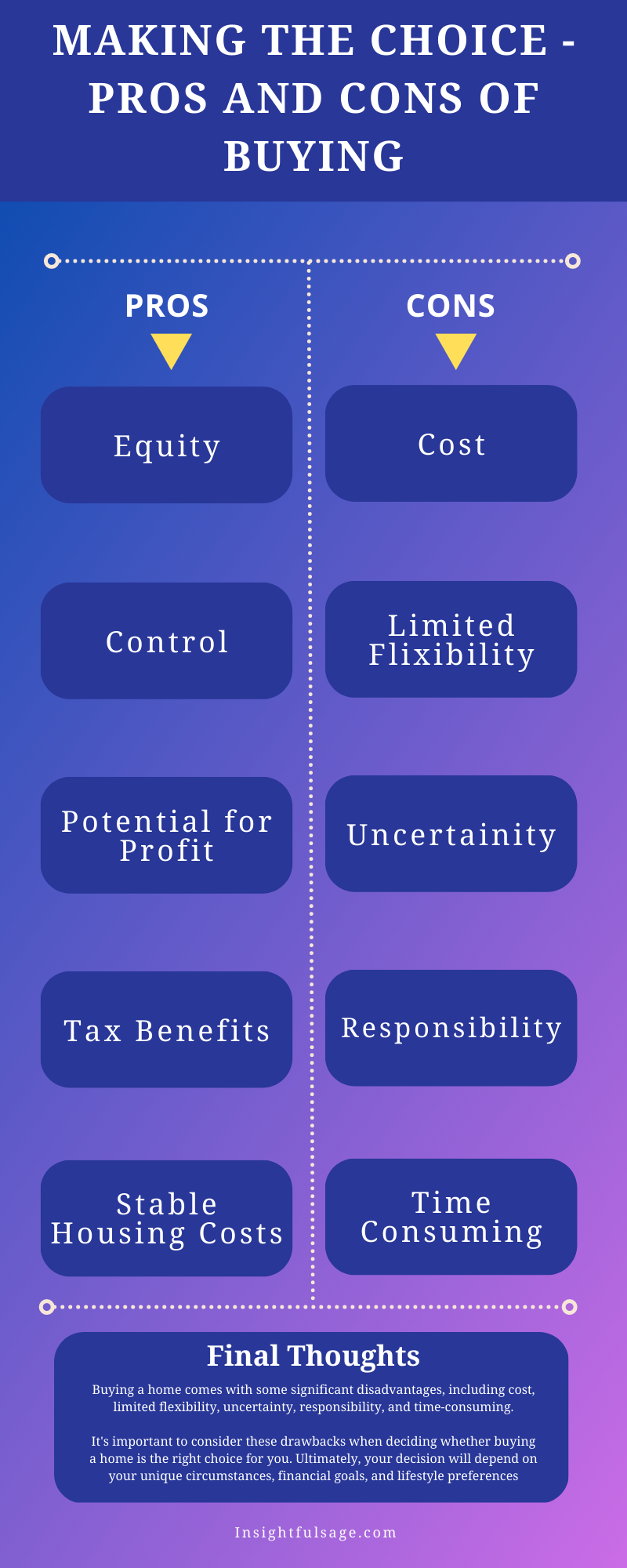Finding a place to call home is one of the most important decisions we make in life. Whether you’re looking to rent or buy, there are pros and cons to both options that should be considered carefully.
Renting offers flexibility and lower upfront costs, while buying a home offers equity, control, and potential for profit. But how do you know which option is right for you?
In this blog, we’ll explore the various factors that come into play when deciding whether to rent or buy a home. We’ll examine the advantages and disadvantages of each option, and provide you with a comprehensive guide to help you make an informed decision.
My goal is to provide you with a friendly and helpful resource that will enable you to weigh the pros and cons of renting and buying, and help you determine the best course of action based on your unique circumstances.
Whether you’re a first-time homebuyer, a seasoned renter, or somewhere in between, this guide will give you the information you need to make an informed decision about your housing options. So, let’s get started and find the home that’s right for you!
Pro Of Renting
Renting a home is an excellent option for many people, and it comes with a variety of benefits that are worth considering. In this section, we’ll explore some of the most significant advantages of renting a home.
Flexibility
One of the most significant advantages of renting is the flexibility it provides. If you’re not sure where you want to live or what type of home you want to live in, renting allows you to explore your options without committing to a long-term mortgage. Additionally, renting is an excellent option for people who need to move frequently due to job requirements or personal circumstances.
Lower Upfront Costs
Another significant benefit of renting is the lower upfront costs. Unlike buying a home, renting doesn’t require a down payment, closing costs, or other expensive fees. This means that renting is often a more affordable option, making it accessible to people with limited savings.
Maintenance
As a renter, you’re not responsible for the cost of major repairs or maintenance. Landlords are typically responsible for these expenses, which can be a significant financial relief. Additionally, if something breaks or needs repair, you can simply call the landlord to handle the issue.
Amenities
Rental properties often come with amenities that might be out of reach for homeowners. For example, a rental property might have a gym, pool, or playground, which can be costly to install in a home.
Renting a home comes with a variety of benefits, including flexibility, lower upfront costs, maintenance, and access to amenities. These advantages can make renting an attractive option for people who are not ready or interested in owning a home.
If you’re looking for a place to live, it’s worth considering the benefits of renting and how they might align with your unique circumstances.
Cons Of Renting
While renting a home has its advantages, it also comes with some drawbacks that are worth considering. In this section, we’ll explore some of the most significant disadvantages of renting a home.
Lack of Control
One of the most significant disadvantages of renting is the lack of control. As a renter, you’re not the owner of the property, which means that you’re subject to the rules and regulations of the landlord. This lack of control can limit your ability to make changes or modifications to the property.
No Equity
When you rent a home, you’re not building equity in the property. This means that you’re not investing in an asset that can appreciate over time, which could limit your financial growth.
Rent Increases
Rent prices can increase over time, making it difficult to budget for the future. As a renter, you have little control over when and how much your rent will increase, which can make it challenging to plan for the long term.
Limited Personalization
As a renter, you might be limited in your ability to personalize the property. Landlords often have rules about what changes can be made to the property, which can be frustrating if you want to make the space your own.
No Tax Benefits
Homeowners can take advantage of tax benefits, such as deductions for mortgage interest and property taxes. Renters don’t have access to these tax benefits, which can limit their ability to save money.
Renting a home has some significant disadvantages, including lack of control, no equity, rent increases, limited personalization, and no tax benefits.
While these drawbacks might not be deal-breakers for everyone, it’s important to consider them when deciding whether renting is the right option for you.
Ultimately, your decision will depend on your unique circumstances, financial goals, and lifestyle preferences.
Pros Of Buying
Buying a home is a significant investment that comes with a range of advantages. In this section, we’ll explore some of the most significant benefits of buying a home.
Equity
When you buy a home, you’re building equity in the property. Equity is the difference between the home’s value and the amount owed on the mortgage. As you pay off the mortgage, your equity increases, which can help you build long-term wealth.
Control
Owning a home gives you a sense of control over the property. You can make changes and modifications to the home as you see fit, without worrying about the rules and regulations of a landlord.
Potential for Profit
If you buy a home in a desirable location, you have the potential to make a profit when you sell it. Home values can appreciate over time, especially in areas with a strong real estate market, which can be a significant financial gain.
Tax Benefits
Homeownership comes with tax benefits, including deductions for mortgage interest, property taxes, and other expenses related to homeownership. These tax benefits can help you save money on your annual tax bill.
Stable Housing Costs
When you buy a home, you have more control over your housing costs. Your mortgage payment is typically stable, which means you can budget more effectively for the long term.
Buying a home comes with a range of benefits, including equity, control, potential for profit, tax benefits, and stable housing costs.
These advantages can be significant for people who are looking to build long-term wealth and stability. If you’re considering buying a home, it’s worth weighing these benefits against your unique circumstances and financial goals.
Cons Of Buying
While buying a home has its advantages, it also comes with some drawbacks that are worth considering. In this section, we’ll explore some of the most significant disadvantages of buying a home.
Cost
Buying a home can be expensive, especially when you factor in the down payment, closing costs, and ongoing maintenance expenses. It’s essential to consider the cost of homeownership, including repairs and upkeep, when deciding whether buying a home is the right choice for you.
Limited Flexibility
Owning a home can limit your flexibility, especially if you’re planning to move in the near future. Selling a home can take time, and you might not be able to recoup your initial investment if you sell too soon after buying.
Uncertainty
The real estate market can be unpredictable, which can make it challenging to determine whether buying a home is a sound financial investment. Home values can fluctuate, and there’s always a risk that you’ll pay more for a home than it’s worth.
Responsibility
Owning a home comes with a range of responsibilities, including repairs and maintenance. As a homeowner, you’re responsible for fixing any issues that arise, which can be costly and time-consuming.
Time-Consuming
Buying a home can be a time-consuming process, from house hunting to negotiating the terms of the sale. It can take months or even years to find the right home, and there’s always the risk that the deal will fall through.
Buying a home comes with some significant disadvantages, including cost, limited flexibility, uncertainty, responsibility, and time-consuming.
It’s important to consider these drawbacks when deciding whether buying a home is the right choice for you. Ultimately, your decision will depend on your unique circumstances, financial goals, and lifestyle preferences.
Conclusion
In conclusion, deciding whether to rent or buy a home is a significant decision that should be approached with careful consideration.
Both renting and buying have their advantages and disadvantages, and it’s essential to weigh these factors against your unique circumstances and financial goals.
For those who value flexibility and convenience, renting might be the best choice, while for those looking to build long-term wealth and stability, buying a home might be the better option.
Ultimately, the choice between renting and buying comes down to your personal preferences and circumstances. It’s essential to take a close look at the pros and cons of each option, and to factor in your lifestyle, budget, and long-term goals.
Whatever you decide, remember that there’s no right or wrong answer. Whether you choose to rent or buy, you’re taking an important step towards creating a home that reflects your values, aspirations, and vision for the future.
So, be kind to yourself and make the choice that feels right for you. With careful consideration and a clear vision of what you want, you’ll be well on your way to creating a home that is a source of joy, comfort, and security for years to come.







